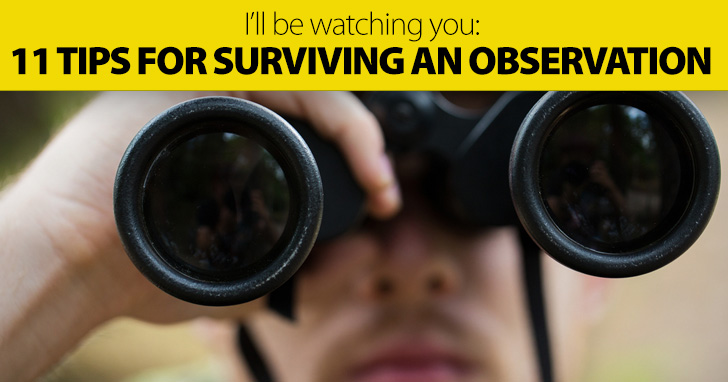
Every professional teacher will, at some point, find their classes being observed.
This might be when applying for a new job, teaching a model lesson for the benefit of trainee teachers, becoming certified, providing a demonstration lesson for prospective students, or impressing the parents of current students. Whatever the reason, it’s often an unwelcome and very stressful experience. With a little preparation, though, you can knock that model lesson out of the park, impress your observers, and build your own confidence as a teaching professional.

Be Ready to Use Observations to Your Ultimate Benefit
-
1
Relax
Whether you’ve been at the chalk-face for thirty years, or whether this is truly your first rodeo, the secret is to let that stress fall away, both before and during the class. Try to find quiet time (ideally, 10-15 minutes before you begin) to simply sit and breathe deeply. This regenerates your focus and enthusiasm; if you have a meditation practice, try a little of that. Remind yourself that everyone involved wants you to succeed, and that the opinions of the observers aren’t a judgment of you as an individual, but simply of this class, today.
-
2
Prepare Thoroughly
Perhaps this goes without saying, but most of the problems you’ll encounter during an observed class will stem from inadequate forethought. Consider preparing for these aspects, in particular:
- Decide Your Learning Aims. What will the students be able to do at the end of class that they were not able to do at the beginning? Make these realistic and specific, e.g. “Accurate use of the modal past,” or “Fluent use of the ‘animals’ lexical group”.
- Divide the Class into Sections. The classic pattern for an ESL class would be:
Review - Present - Controlled Practice - Free Practice - Final Review/Game
This approach gives the class a moderate, steady pace. Decide on your approximate timings; no section should be longer than 15-25 minutes, depending on the content, lest the students become restless. Make sure to vary the Interaction Patterns (Teacher to Student, Student to Student, etc) so that there isn’t too much repetition of one approach. New teachers should write all of this on their plan. Which brings us to… - Write the Plan. You may operate without a plan normally - I can’t recommend this approach, even for the most experienced teachers - but for an observed class, a hard-copy plan is absolutely essential. Not only does it show that you’re organized and prepared, it also gives you something to hand to your observers; they can follow the structure and content, which is much more engaging than simply watching the class happen. Have copies available of any and all handouts, quizzes, puzzles etc so that the observers can see them without having to peek over a student’s shoulder.
- Make Notes. The best teachers return often to their plan, not only to make sure they haven’t forgotten something, but also to add notes, ideas and suggestions to their ‘future selves’; the next time you teach this content, you’ll have sage advice from one of the best teachers you know: you. Observers like to see this, as it speaks of professionalism and a true desire to improve.
- Use Your Materials. Whether or not you’re a fan of using objects, hand puppets, board drawings and pictures as teaching tools, consider including some ‘realia’ in your observed class. Students respond well to objects and resources which lay outside of their textbook; it also shows the observers that you’ve thought carefully about how to present the material, and have an open, flexible approach to presentation methods.
- Home Movies. I recommend that you teach the Presentation section of your class to an empty room, in front of a camera, before doing so for real. Observe yourself and be dispassionately, constructively critical:
- Did you speak too quickly for the level of students you’re working with?
- Would someone with limited English be able to understand your examples?
- Could you have used the board better?
- Would a picture have told a thousand words?
- Could you pare down your TTT (Teacher Talking Time) by 10%, or 20%, or more? (Hint - Yes You Can!)
- Could you use your hands or face more as part of your explanation, to further cut down on the number of words you’d need to use?
The two most common reasons observers criticize teachers are that they spoke too much (thereby dominating the space at the expense of their students) and that they didn’t explain the target material clearly enough (because they hadn’t practiced doing so). Recording yourself provides hard evidence of whether or not they’ll be saying these things of your class. - Error Correction. What are your students likely to get wrong? Will it be an aspect of pronouncing the new words correctly? Or might they forget a helping verb in the new structure? When this happens, how will you react? Practice your responses to student errors; gestures help a lot here. A raised finger is a warning of a mistake just made; crossed hands encourage the student to re-think word order; drawing a big ‘S’ in the air reminds students to conjugate for the third person, etc.
- Who’s Going to Act Up? Consider separating students who you know have a tendency to distract or annoy each other. Break up national groups so that you won’t have to contend with students speaking L1 in the classroom. Ensure that your lesson plan includes additional practice or research tasks to keep everyone busy, including the students who are quickest on the uptake; boredom is the chief reason for poor classroom discipline, so find ways to engage everyone, from the beginning of the class to the end.
- Decide Your Learning Aims. What will the students be able to do at the end of class that they were not able to do at the beginning? Make these realistic and specific, e.g. “Accurate use of the modal past,” or “Fluent use of the ‘animals’ lexical group”.
-
3
Check Your Attitude
Everyone is different, but most observers would agree that the best teachers are:
- Governing by consent, not ruling by fear
- Light-hearted and ready to laugh, but purposeful and driven
- Responsive and flexible; prepared always to teach the class, not the plan
- Thoroughly prepared, full of good examples, and obviously knowledgeable
-
4
When It’s All Over
True professionals are dedicated to continuous self-improvement. Approach your observers and ask if they’re prepared to share their findings with you; in some situations this won’t be appropriate, but it’ll look good if you ask! Finally, I always like to tell my observers that I’ve enjoyed myself, and that it’s been good to have them in my classroom. Try doing this, even if your real feelings might be closer to, “Thank heavens that’s over!”
If you’re relaxed, very thoroughly prepared, and have thought through in advance the likely challenges of a class, it’ll hardly make any difference that a bunch of strangers are watching you teach.
Be yourself, respond to your students’ needs, and show everyone that you’re a dedicated, well organized professional.
P.S. If you enjoyed this article, please help spread it by clicking one of those sharing buttons below. And if you are interested in more, you should follow our Facebook page where we share more about creative, non-boring ways to teach English.







